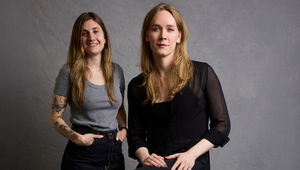
How To Cut It In Tokyo Post Production

Setting up shop in 2012, Cutters launched its full service office in Tokyo after the US post production studio saw an explosion of work coming out of the East Asian market. Managing director and editor Ryan McGuire, executive producer Timo and colourist Ben Conkey head the Tokyo team. In fact McGuire (the son of original Cutters founder and CEO Tim McGuire) first landed in Japan on a homestay as a teenager and fell in love with the country and its people. He learnt the language and kept his ear to the ground for opportunities to work in Asia.
“I first came to Japan as a kid,” McGuire recalls. “I graduated from university in Tokyo and I got my first ‘real job’ here,” he says. “I had ten years under my belt before cutting the ribbon at Cutters Tokyo. But I'm still learning. Everyday. Managing a multicultural team of artists, selling an abstract product born of western culture, and navigating Japan's never-a-dull-day bureaucracy is a delicate dance. But it keeps me on my toes.”
In Japan, Cutters now boasts over 69 clients, 80 per cent of which are Japanese brands from a diverse range of industries including SKY PerfectTV!, Asahi, Mazda and SoftBank. Some of the studios’ most frequent agency collaborates include Wieden+Kennedy Tokyo, TBWA\HAKUHODO, Ogilvy & Mather, Grey, Beacon Communications, Dentsu and Hakuhodo. The post house’s popularity is attributed to its introduction of a more collaborative creative pipeline, rigorous editing standards and its overall international approach to film production.
With no shortage of praise from Tokyo industry heavyweights, Cutters has been described as a “breath of global fresh air in the Japanese commercial TV industry”. “Working with Cutters can get me an international post perspective and creative experimentation with the story,” gushes Jon King, ECD at Beacon Communications (Leo Burnett Tokyo). “But they are also a team that understands the local sensitivities and can work closely with my Japanese creatives.”
W+K Tokyo creative director Adam Koppel agrees, stating: "Cutters has become a bit of a home away from home for us. It's a great collaborative environment with talented editors. It's always exciting to find people like that to work with." High profile Tokyo directors are also quick to give their seal of approval. Popular director Yukihiro Shoda confirms the studio’s artists bring their own fresh ideas to the table. “That’s what I really like – working with talented friends and creating wonderful films is so much fun for me,” he says. “I recommend them highly. You'll see what I mean!”
Often heralded as wacky, bold and oddly creative, Japanese advertising is starting to reach further far-flung corners of the globe. “These days what happens in Japan no longer stays in Japan,” says McGuire. “It's on YouTube, Vimeo, Facebook, you name it.” He says an increase in exposure, coupled with Japan's equal access to work created for other markets, is driving creativity in the country. “The work is getting exponentially better, and we're having more fun!”
He says these days the role of the editor in commercial production is becoming increasingly important in order to meet the rapidly growing consumer demand for content that sees agencies designing multiplatform campaigns and repurposing footage for a range of media outlets. And this is proving to be a great opportunity for creative post production outfits like Cutters.
“We've developed pipelines to efficiently deal with the new demands of the industry. Cutters’ editors become brand experts. Keeping the marketing goal in mind, we can produce quickly and effectively to meet client needs. And we edit specific to the media we are creating the content for. For example, a 60-second TV ad has a relatively captive audience that allows for a slower build to the story. On the other hand, a YouTube bumper needs to engage the viewer quickly or the ad will get skipped. We're no longer just making pretty pictures.”
Commenting on Japan’s top down hierarchical society and how it impacts on adland, McGuire explains social hierarchy still runs deep in all Japanese business. “At times it can result in great efficiency, but exceptional filmmaking comes from sharing and developing great ideas as a team. Crucial to this process is great communication. A system that artificially dictates who can tell whom what to do, does nothing but impair the creative process. We've still got some work to do in this department.”
A lot of Japanese advertising, he says, remains formulaic: slightly updated product or new packaging plus celebrity plus price tag – classic awareness fodder. “This kind of advertising makes for immediate, amphetamine-like gains. But it produces no lasting brand value. The process needs to be repeated incessantly to maintain sales numbers.” Lifetime employment also guarantees employees promotions based on time served versus level of performance. “If performance isn't incentivised, people tend to maintain status quo. In that system, it doesn't pay to be bold.”
As the third largest advertising market in the world, Japan tends to do relatively well at global award shows, but according to McGuire, too often the goal in doing great work is a shiny trophy for the office versus the actual success of the ad. “This is misguided and projects with no budgets but the promise of recognition in their stead are becoming all too common.” He says the bottom line should be making great advertising that furthers the brands and gives clients a return on their investment. “Those are the simple makings of a happy industry.”
Incongruence in language and culture has always been a big barrier to market entry for global companies looking to open in Japan and McGuire admits knowing when to ‘call bullshit’ is indeed essential. But getting this right can require extensive experience navigating Japanese bureaucracy. “It doesn't make sense to sell ice to the Eskimos. There's a ripe opportunity for companies able to challenge the status quo and offer something different, while remaining respectful of cultural differences. This is a full time job!”
McGuire frequently fields requests to work on projects in the Japanese market due to his strong editing skills, fluency in the language and cultural understanding. “I found myself developing relationships in Tokyo with great directors like Hisashi Eto, Kosai Sekine and Takeshi Nakamura. The Japanese market continues to be very interested in working with us.” With the growth of emerging markets like South Korea and China, he says it’s important to have a strong presence in Asia.
Travelling frequently throughout Asia, McGuire aims to open up another studio in the near future. He says Shanghai and Bangkok are looking most promising, as the studio is already doing a substantial amount of work in these markets. “Our business is all about people. We hire smart, personable and passionate people. That's it. Skills can be taught. If we can find the right people to run our businesses, we'll open up shop. Stay tuned.”
Check out some of Cutter's most recent work:















